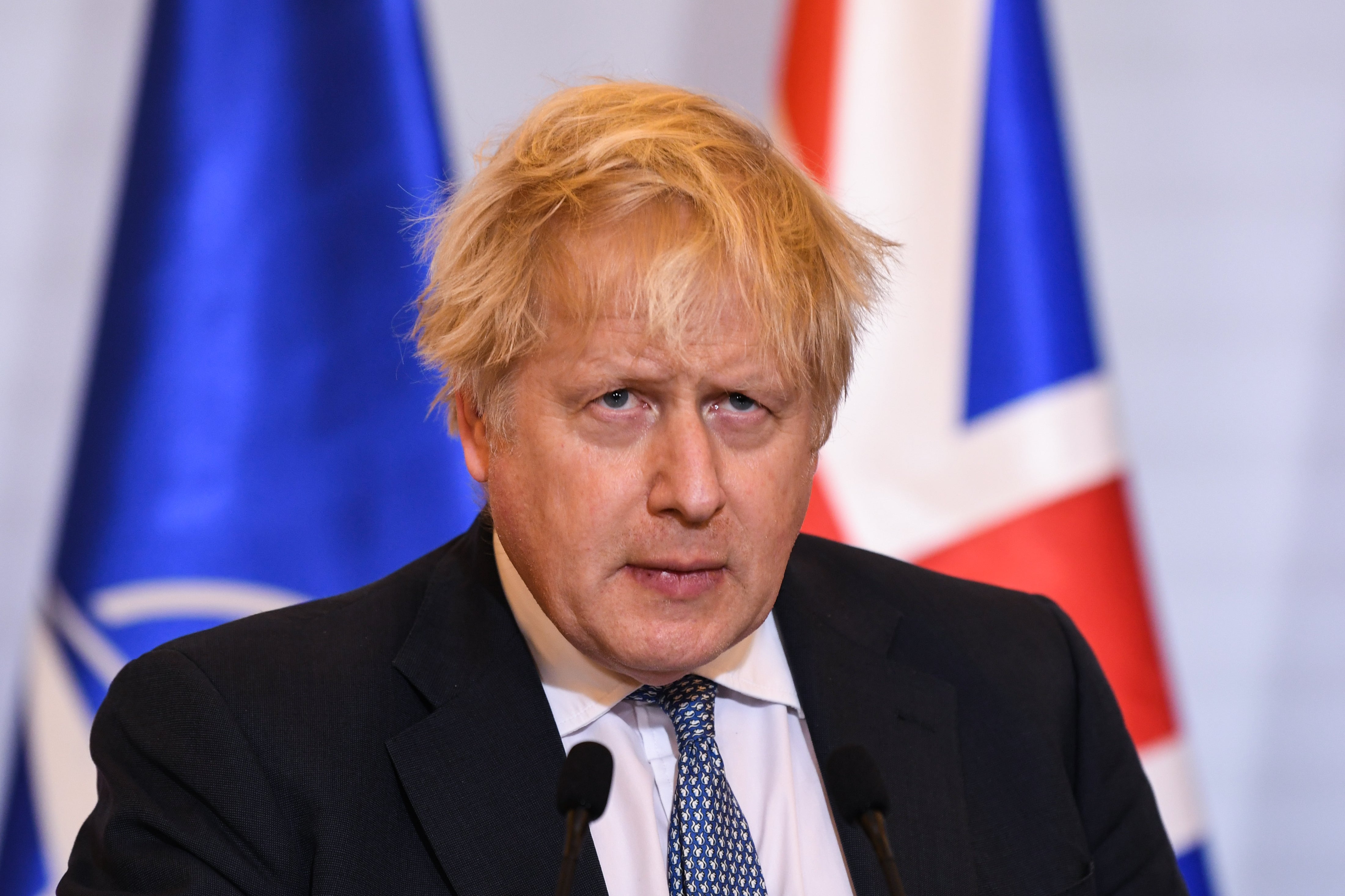If Boris Johnson is serious about tackling Russia, he needs to make peace with the EU
The PM is desperate to please his one-time cheerleaders, Eurosceptic MPs – who are tiring of him because they think he is not exploiting the ‘opportunities of Brexit’. But he should resist temptation, writes Andrew Grice


For both Boris Johnson and Liz Truss, there was no escaping the Downing Street parties saga when they headed east to discuss the threat of war in Ukraine. It was the third time Johnson had tried to play the statesman to divert attention from his domestic woes, but on each occasion he has been distracted from his own distraction by another damaging twist on “Partygate”.
Other attempts to show Johnson is “getting on with the job” have also been overshadowed – including a £9bn package to cushion the energy price hike and a white paper on “levelling up”. Even his rushed announcement that Covid restrictions would end a month earlier than planned in England mustered only two cheers from grumpy Tory MPs, and was soon eclipsed by more “Partygate” revelations.
The plain-speaking Truss had a baptism of fire in Moscow, where she got the full Sergey Lavrov treatment after ruffling feathers by accusing Russia of reviving Cold War rhetoric. The veteran Russian foreign minister was openly dismissive of the new kid on the diplomatic block.
Truss stood her ground but wasn’t helped by her domestic backdrop. The Russians knew full well, as one media interviewer told her, that Johnson is “fighting for his political survival”. Truss replied: “The prime minister is doing a fantastic job.”
Not an ounce of difference between her and Johnson there. The deliberate difference is with Rishi Sunak, her main rival for the Tory succession. While the chancellor has distanced himself from Johnson, the foreign secretary is remaining loyal to the end – even if it is a bitter one.
To the outside world, Sunak looks braver, although he is not yet prepared to move against Johnson. But loyalty is the Tory party’s “secret weapon”, according to Lord Kilmuir, home secretary in the 1950s, and one senior figure told me: “Liz knows her target audience – Tory MPs and members. Rishi has upset some of them.”
However, there could soon be tension between Truss and Johnson over the other issue at the top of her in-tray: the EU. On Friday, she made what allies described as a “big offer” on the Northern Ireland protocol in talks in London with Maros Sefcovic, the European Commission vice-president. Officials tell me it went “well beyond” what her predecessor David Frost, who resigned in December, had put on the table.
Truss hopes for an interim deal soon on customs checks on goods going from Great Britain to the province, with difficult issues such as the role of the European Court of Justice put off until after the May elections to the Northern Ireland assembly. The politics of the province is again in turmoil.
UK ministers hope the Democratic Unionist Party’s pre-election manoeuvring – Paul Givan has resigned as first minister and the party is warning it might not return to the power-sharing government after the elections – will concentrate minds in Brussels. The message from ministers is that the collapse of cross-party self-government would be much more serious than any problems with the protocol. However, there is a risk the EU regards her “big offer” as a rather a small one, and that the two sides remain far apart.
The two issues at the top of Truss’ agenda – Russia and the EU – are inextricably linked. To maintain a united front against Vladimir Putin, the west cannot afford to fight amongst itself; that requires an improvement in UK-EU relations, and the protocol is the biggest barrier to it.
Johnson is part of the problem. As he thrashes around for ideas that appeal to Tory MPs in the hope of saving his skin, he has revived the idea of triggering Article 16 to suspend all or part of the protocol. Steve Barclay, his new chief of staff, has been updating contingency plans for the move as part of his Cabinet Office ministerial role to ease supply chain problems.
To keep up to speed with all the latest opinions and comment sign up to our free weekly Voices Dispatches newsletter by clicking here
An optimist might view the spectre of Article 16 as part of a “hard cop, soft cop” strategy as Johnson makes threats and Truss negotiates constructively. Yet there might be a more depressing explanation. In Johnson’s one-to-one meetings with Tory backbenchers, members of the European Research Group have demanded a tougher line on the protocol. Never mind that it was Johnson who agreed it with the EU.
The PM is desperate to please his one-time cheerleaders, who are tiring of him because they think he is not exploiting the “opportunities of Brexit”. But Johnson should resist temptation. If he is serious about tackling Russia’s threat, he would opt for peace with the EU rather than a mutually-damaging trade war, which Brussels is threatening if he rips up the protocol. Who would most love that? Putin, of course.
Invoking Article 16 might not even aid Johnson’s struggle to survive; moderate Tories, many of them former Remainers who want to end the senseless war with the EU, might then submit letters calling for a vote of confidence in him, allowing the threshold of 54 to be crossed.
Johnson should go the extra mile for a deal with the EU, rather than dance to the Eurosceptics’ tune once again.
Join our commenting forum
Join thought-provoking conversations, follow other Independent readers and see their replies
Comments
Bookmark popover
Removed from bookmarks